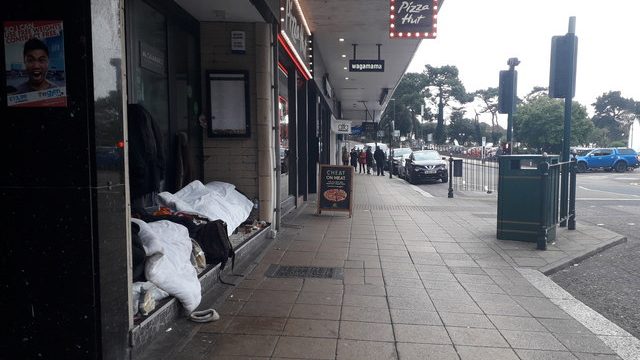Human rights campaigners have launched a landmark legal bid to determine whether homeless people are being “criminalised” by fines against begging and leaving bedding in doorways.
Sarah Ward, a local councillor who lives in Poole, has been granted permission to take her local authority to court over a public space protection order (PSPO) which she argues punishes rough sleepers.
An order introduced in Poole town centre in April last year can see people receive a summary conviction and fines of £100 if caught “using a receptacle for the purposes of begging” or “leaving unattended belongings, baggage and bags”. If left unpaid, the fine can rise to £1,000.
Ward has so far raised more than £3,500 to cover the legal costs of a hearing which is set to take place at the High Court in the new year, having been denied legal aid.
“The council is equating poverty with anti-social behaviour, and needs to scrap the PSPO,” she wrote on her crowdfunding page. “Continuing to fine people for being homeless or poor, during a time when homelessness has gone up by over 160 percent in the last eight years and when food banks can barely meet demand, is cruel and will only make it harder for people to improve their situations.”
Bournemouth, Christchurch and Poole (BCP) Council said, at the time the PSPO was introduced, that it would “not be used to target any specific group, such as rough sleepers”.
“The council proactively works with individuals to encourage them to use the full range of support available from the council and local charities,” councillor Karen Rampton, cabinet portfolio holder for housing and communities, said at the time.
“We will continue to engage and support wherever possible our most vulnerable members of our community,” she added, giving examples of supporting people with drug and alcohol problems, helping others into housing or offering healthcare and hot meals.
PSPOs were introduced by the government in 2014 to increase local authorities’ powers to tackle anti-social behaviour. They enable councils to make certain predefined activities prosecutable offences within a specific geographic area.
An investigation by The Guardian found that in 2018 there were at least 60 councils with PSPOs forbidding people putting up tents, seeking charity among other behaviours associated with rough sleeping.
Ward has the backing of human rights group Liberty and the outcome of the case could set a precedent for other local authorities using PSPOs in the same way.
You can donate to cover Ward’s legal costs here.







